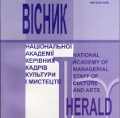Сцена як універсум комунікативної діяльності людини
Stage as a universe of human communicative activity
Author(s): Lyudmyla Vaclavivna TanskaSubject(s): Theatre, Dance, Performing Arts, Aesthetics, Communication studies, Modern Age, Sociology of Culture
Published by: Національна академія керівних кадрів культури і мистецтв
Keywords: culture; universe; scene; action; event; chronotope; scenics;
Summary/Abstract: The purpose of the article. The research is connected with the definition of culturological bases of synthetic image formation in the system of modern communication and opening of stage space as a communicative phenomenon in the context of the transformation of spectacular cultural practices of the XX century. The research methodology consists of theoretical and interpretive models of comparative and systematic approaches to the definition of stage space as cultural integrity. The scientific novelty of the work is to reveal the peculiarities of cultural creation of stage space in the twentieth century, when artists turned to previous systems of artistic reflection, figurative distinctions of the stage in culture. Emphasis is placed on the relevance of the study of the communicative properties of the stage in cultural construction. The stage can be remote, virtual, chamber, monumental. However, the scene from the category of subjectspatial dimension passes into another dimension - time. On the stage you can not break the unity of time and space, the stage is the unity of action and event, and also presents a certain space-time - chronotope, human image, an image of the day. Conclusions. The revival of the pre-cultural, pre-civilization in the broad progressive sense of the word world of the stage becomes the basis for a polymorphic definition of the communicative dimension of the stage as such. Stage space in the modern dimension requires a comprehensive interdisciplinary study, which focuses on discursive analysis, phenomenological and aesthetic studies of the categories "stage", "act", "action", "event", "creativity", etc. The article only raises the issue of interdisciplinary research tools. Further elaboration of the problem field requires separate investigations.
Journal: Вісник Національної академії керівних кадрів культури і мистецтв
- Issue Year: 2021
- Issue No: 4
- Page Range: 39-43
- Page Count: 5
- Language: Ukrainian

